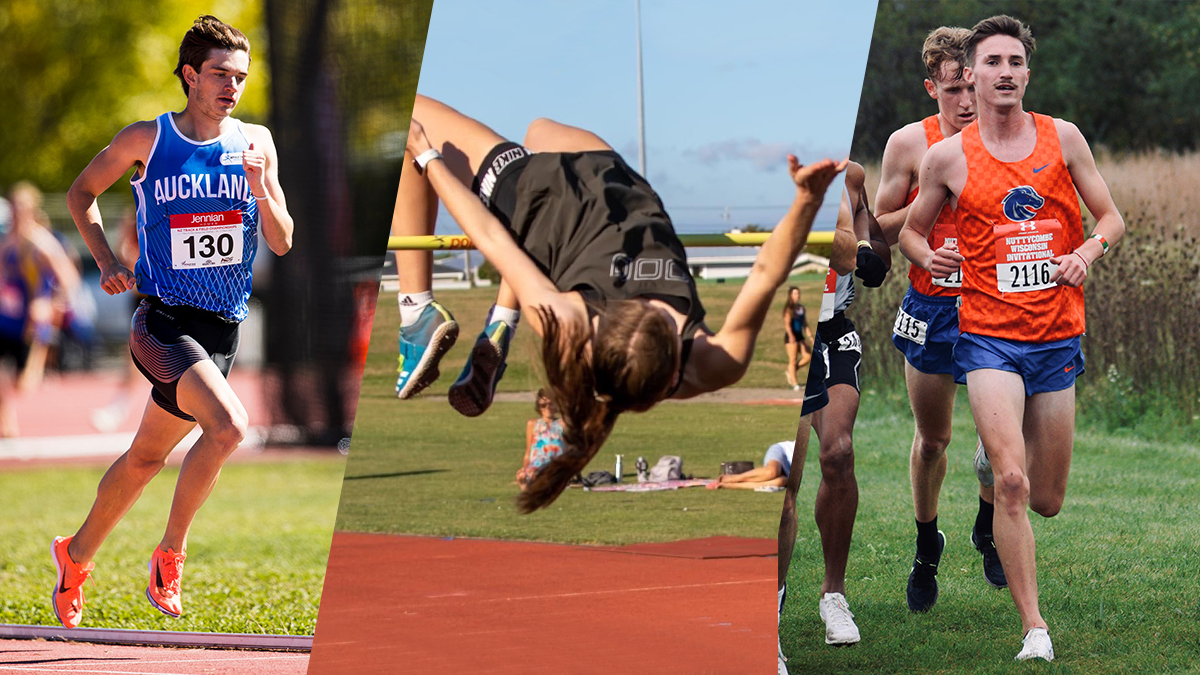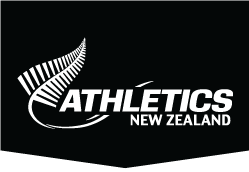News & Updates
Guidance for Kiwi athletes heading Stateside

James Harding (left), Josie Taylor (center) and Murdoch McIntyre (right)
Each year a significant number of Kiwi athletes head Stateside to take up a college scholarship in pursuit of the next steps in their athlete development. With more than nearly 4000 colleges this can be a daunting process, so to make things a little simpler we speak to three Kiwis who are happy to pass on their learnings of the important things to consider when selecting a university with the right fit.
*Murdoch McIntrye – The Auckland-raised distance runner is a junior student at Boise University in Idaho.
*Josie Taylor – The Hamilton City Hawks club member and 1.85m high jumper is a freshman at Rice University in Houston.
*James Harding – The 18-year-old national U20 800m and 1500m champion is set to attend the University of Oregon from August 2022.
1 – Prepare well
To ensure the best choice of college is made preparation is vital. For high jumper Josie Taylor her motivation was ensuring a trade-off was made between attending the best possible academic school and the best one to aid her athletics journey and so she landed on Rice University in Houston. Yet the process was long and exhaustive.
“I was known as the spread sheet queen,” she quips. “I had a spread sheet containing all the factors that were important to me next to all the potential schools. The process took weeks and weeks and weeks before the options were narrowed down,” she explains.
2 – Seek guidance from US-based Kiwis
Murdoch McIntyre recalls many lengthy conversations chatting to other New Zealand athletes attending US colleges as a key part of the preparatory process for Stateside life. The Boise State University student says he talked to Mitchell Small, Theo Quax, Jacob Holmes, Isaiah Priddey and James Uhlenberg and described them as “super helpful.”
“It was good to talk to them and get an understanding of their hands on experience of what it is was like to live and train in the US,” he explains. “It is a bit like when you go on vacation somewhere new, you have an idea in your head of what it might be like but without that innate knowledge, it can turn out to be different.”
James Harding, who boasts an 800m PB of 1:48.95, also tapped into the US experiences of the likes of Tom Moulai and Sam Tanner describing the pair as a “huge help.”
3 – The sifting out process
Murdoch, 20, was in the fortunate position that many colleges were interested in recruiting the former New Zealand U18 cross country silver medallist. However, he admits narrowing the options down is a “super hard” process.
“When every school sounds so good you need to sit down and think carefully about all aspects – your running, school and general life and see whether the school meet the needs of all three,” he admits. Do you want to be on a team with a strong programme where you might not necessarily be the best guy in the programme? Do you want to be more of a mid-packer or one of the strongest on the team? There are bunch of factors to consider. I once received some good advice from a mate who said put a percentage on everything you value, so whether that is 90 per cent for your coach, 40 per cent on academics and 20 per cent on the climate – I thought this was very good advice.”
4 – Don’t be blinded by facilities
Both Josie and Murdoch believe the university facilities should not be a major consideration when selecting a college.
“No matter which university you go to – whether it is the best budgeted or the worst budgeted they are probably going to offer a lot more than what is on offer in New Zealand,” says Murdoch, 20. “The facilities are unreal in the US, but I wouldn’t focus on facilities there are other more important factors like your choice of coach.
Josie, the 2021 New Zealand U20 high jump champion agrees and adds: “Facilities don’t play a massive part because you will find all the colleges will have ten times more than what it on offer in New Zealand. Be more focused on your choice of coach and the degree. For me, those were the main factors.”
5 – Coach is king
All three athletes believe selecting the right coach to work with is key to ensuring the best possible US experience.
“At the end of the day the coach is like your boss during your time in the US and they can make your life fun and exciting or a bit of a nightmare,” adds Murdoch, who says finding a coach you can work before heading across to the US is critical.
“For two-and-a-half years I was asking questions to coaches on Zoom calls,” he says. “Before the call have a really big think about what you want out of the call. Try not to let the coach waffle on. Most university recruiters are good talkers. It is their job. But it is your job to get something out of the conversation which is going to prove to you that the coach can serve you well as an athlete. Be prepared for those conversations.”
Josie too echoes the thoughts of Murdoch. “Before your Zoom chat with coaches make sure you have a massive list of questions prepared,” she says. “You want to know about how training will look, coaching style, how often you will compete, how training will look leading into a competition. I always make sure I have a new set of questions every time I’m on Zoom. You’ll get a good vibe from the coaches you feel you can work with.”
Making a good connection with the coach was also critical for James.
“A big question to the coach from me was, where do you see me in the next few years? I don’t want to go over there and be a pacemaker for the older boys or play second fiddle to someone else. You want the coach to value you and to be a key component of the team.”
6 – Training set up
Following on from the coach selection making sure the proposed training set up fits the needs of the athlete is also important. Josie was impressed that her coach, Jonathan Hill, had coached a group of high jumpers who had cleared the mid-1.90s.
“Jonathan has a lot of experience with specific high jump coaching. Another factor was the ability to train with others, which I can, because we have a group of heptathletes.”
Middle-distance runner James adds: “It is important to ask the coach what is a typical training week what are the key workouts? If you have a training programme that currently works for you, it is important not to switch up the training too drastically.”
7 – The importance of team
Besides the coach it is also vital to be able to get along with your team-mates. You are likely to train daily with this group of people, so finding out a little about what makes then tick prior to starting college life is important, according to Murdoch.
“I set up Zoom calls to try and figure out a way if they aligned with me and I wanted to be around them,” he explains. “It is hard on Zoom, but you can get some idea. Although what I would say is, if you find a coach that aligns with your values then more often than not, you’ll find a team that aligns to the same set of values and you will likely get on with them.”
8 – Geography
The USA is a vast country with many different climatic regions. From the cold northeast – which can have prolonged period of snow and ice in the winter – to the hotter southern states geographical differences can be significant and should be a consideration before selecting a college.
Murdoch says Boise’s relative temperate climate was an attraction. “Boise does get cold but not super cold compared to other places,” he says.
James says the weather he is likely to experience in Eugene is not too different to that back home in New Zealand. “I didn’t want to go to a really hot climate or one that was freezing cold throughout the winter. I’m lucky that Oregon is similar to New Zealand – except perhaps with even more rain!”
9 – Take time for paperwork
Once you start your application process for a college it is important to consider the lengthy period of times it takes to complete all the documentation.
“Nobody really talks about the transcripts, government documents and visa which is required for your NCAA eligibility but be prepared for a decent amount of paperwork at the tail end of the process,” adds Murdoch. “Having been through the process it can be a bit overwhelming.”
Josie admits: “I was a bit unprepared for the vigorous documentation process. It was intense, so give yourself plenty of time to prepare everything to help avoid stress.”
10 – Academic factors
Depending on the individual student some place more or less emphasis on the strength of the school’s academic programme. For Josie she selected Rice University on the basis that it was a leading school for architecture meanwhile James says his desire to study criminology at the University of Oregon was an important factor.
“I was keen to study psychology and criminology but not all colleges offer criminology as a degree, so that limited my options,” he says. “Along with the coaching set up and track programme that made the University of Oregon the best fit.”
